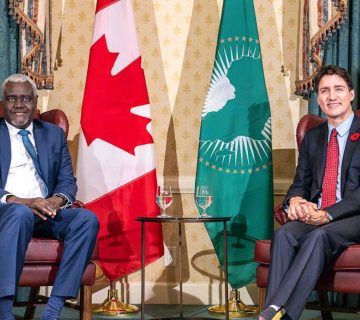A dispute is pending at the International Court of Justice (ICJ) over delimitation of the complete course of the maritime boundary, including the outer limits of the continental shelf beyond 200 nautical miles, between Kenya and Somalia in the Indian Ocean, which Somalia launched in 2014. During preliminary proceedings between 2016 and 2017, Kenya objected to the Court’s jurisdiction over the matter, citing a Memorandum of Understanding (MoU) of 2009 between Nairobi and Mogadishu, and to the admissibility of Somalia’s case. However, Kenya lost on both accounts and the matter is to proceed to the main case any time from the submission of memorials by Somalia and counter-memorials by Kenya. Both countries are seeking to establish their continental shelf beyond 200 nautical miles, and information and data which includes maps to such effect, are before the Commission on Limits of the Continental Shelf (CLCS). However, CLCS cannot proceed to render a determination, while a dispute pends at an arbitral body for a binding decision over delimitation of the 100,000 square kilometers maritime zone. The disputed maritime zone harbors an estimated 100 billion barrels of hydrocarbons, which further raise the stakes in the dispute.
Mounting Tensions
From mid-February 2019, tensions between Kenya and Somalia have been building after Kenya’s protest against alleged auctioning of oil blocks by Somalia in the disputed maritime zone, at a London Conference on February 7, 2019. Consequently, Kenya expelled Somalia’s diplomat to Nairobi and recalled its diplomat to Mogadishu on February 16, 2019, at the height of the tensions. In its demarche, Kenya protested Somalia’s apparent breach of Kenya’s sovereignty and territorial integrity.
Having suffered a legal defeat during the preliminary proceeding at the Court while attempting to block the case from proceeding, and having had a false start at alternative settlement mechanisms outside Court through the MoU, Kenya is left to explore other ways of achieving a withdrawal of the case from ICJ by Somalia. Kenya maintains that the judicial process is adversarial and undermines the spirit and legacy of brotherhood and good neighborliness between it and Somalia. Both countries share a cross-border Somali ethnic group and face the threat of al Shabab and piracy in the Indian Ocean. On the other hand, Kenya has remained a crucial partner in Somalia’s stabilization and development. Currently, the Kenyan military is engaged under the African Union Mission in Somalia, in stabilization operations and the fight against the extremist al Shabab group in Somalia. Kenya also hosts the largest refugee camp in the world, with mainly Somali refugees since the collapse of Somalia in the early 1990s. It is in consideration of these web of relations and the history between Kenya and Somalia, that Kenya emphasizes alternative settlement mechanisms.
Ethiopia and Regional Diplomacy
At the height of tensions with Somalia, Kenya’s president, Uhuru Kenyatta, visited Asmara on March 3, 2019 for a summit with Eritrean and Ethiopian counterparts. The meeting was followed by a visit by the Somali President, Ahmed Farmaajo, to Addis Ababa on March 5, 2019, in which ‘mechanisms to ensure Somalia-Kenya relations are strengthened’ were discussed between Farmaajo and his Ethiopian counterpart. Later the same day, the two leaders flew together to Nairobi where the Ethiopian Prime Minister and current Chairman for the Inter-Governmental Authority on Development (IGAD), Abiy Ahmed, was keen to help normalize relations between Kenya and Somalia. The outcome of the Nairobi meeting, at least as of March 6, 2019, was Kenya and Somalia agreeing to work toward peace and take measures in addressing particular issues that escalated the tensions.
The Bottom Line
Meanwhile, Kenya is exploring alternative diplomatic approaches to resolving its maritime dispute with Somalia. The window for such maneuvres is however fast closing due to case scheduling and Somalia’s reluctance to negotiations. Kenya should double its diplomatic efforts toward a negotiated settlement to the dispute, perhaps with the help of a neutral third party. The uncertainty of the judicial process and the cost of continued tensions are imposing unacceptable risks to the region’s security and stability.
Above all, there is need to create a positive incentive structure for alternative settlement to assist Somalia to change its approach to negotiations and compromise for regional peace, the best for mutual benefit.
Edmond J. Pamba is a Research Assistant at the HORN Institute.
Photo Credit: Wikimedia Commons



